During COVID-19, These Los Angeles Bike Shops Are a Lifeline to Their Communities
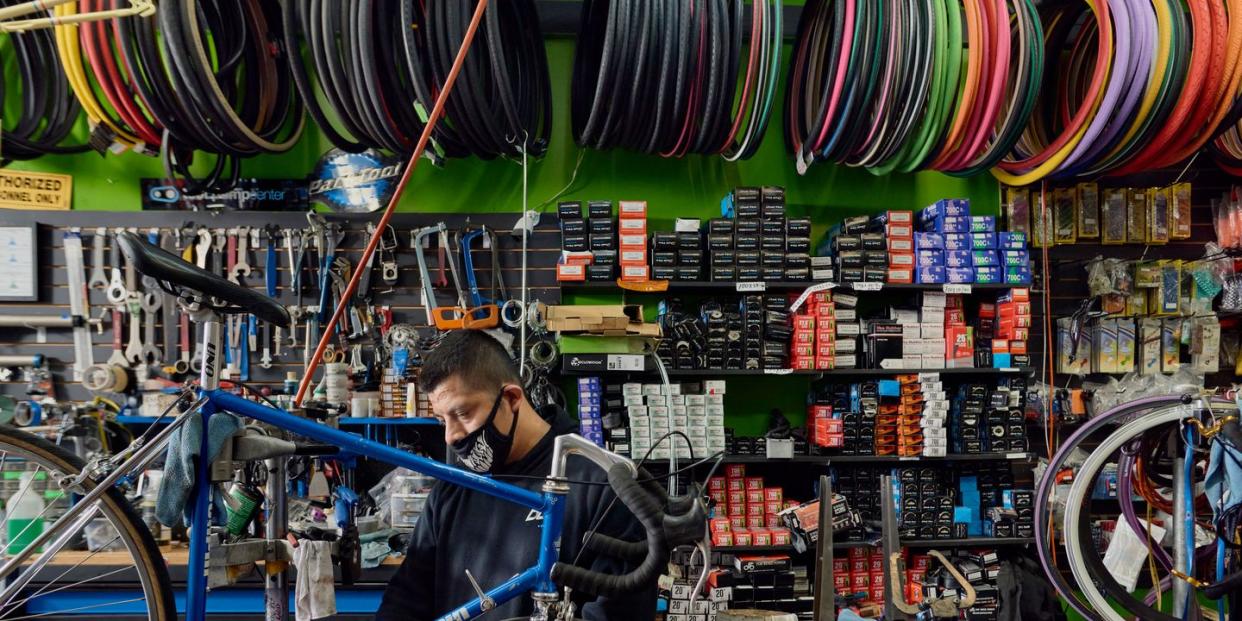
The man in his 60s on the BMX bike rides through the front door at Paisano’s, a bike shop in South Los Angeles, with a beat up 27-inch mountain-bike wheel in his left hand. The tire is flat.
He pedals his bike past shop technician Abraham Tejeda toward the roped off maintenance area. “I’ve worked here my whole life,” Tejeda says. “The shop was opened in 2000 by my pops.” Tejeda describes the repairs that the shop is handling this week—flat and rotted tires, rusty chains, brakes and gears that need simple adjustments.
It is the first Friday of April, 15 days after California Governor Gavin Newsom announced a statewide shelter-in-place order. In Los Angeles, San Francisco, and other large cities in California—as well as in many other states—bike shops have been classified as essential businesses, a move that has been celebrated by some and derided by others. Some critics have argued that bike shops primarily cater to privileged fitness-oriented hobbyists and that putting shop staff in harm’s way (and risking community spread of disease) to serve recreational riders is unwise. But that assumption renders invisible the thousands of neighborhood shops in cities across the country that serve customers who mostly rely on bicycles to facilitate their livelihoods, customers from some of the most economically vulnerable communities in the U.S.
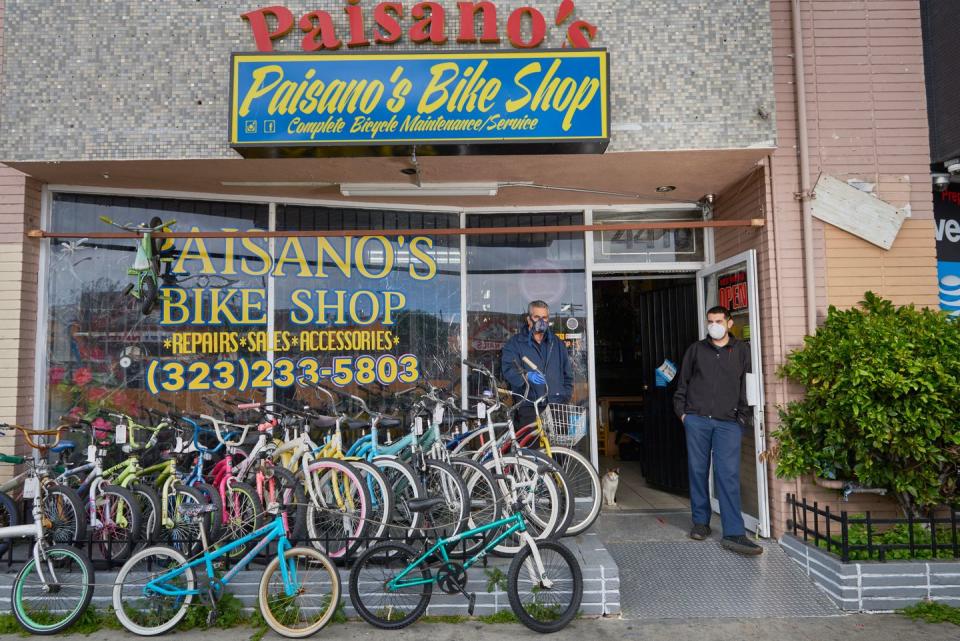
In LA, for example, Paisano’s and other shops in neighborhoods like Compton and South Los Angeles provide a vital service to people who depend on bicycles to get to and from work. These small businesses are perhaps 15 miles and universe away from LA’s affluent coastal suburbs where bike shops are typically stocked with $300 bib shorts and $10,000 road bikes.
Out front at Paisano’s sit a couple racks of used bikes, like a yellow Schwinn Legacy tagged at $59. Inside, there’s a wide range of new bikes, including some models from Fuji and Haro. Tejeda says that fixed-gear freestyle bikes, flat-bar bikes that combine elements of BMX bikes with fixies, are a big category for them. He also says that a lot of their younger consumers use a layaway plan that gives them up to 60 days to pay for a bike in installments.
In the back of the shop, a mechanic examines the mountain bike tire. He pumps it with air and hands it back to the older gentleman, who is still sitting on his BMX bike. He spins that bike around, rolls out the shop’s front door, and pedals down South Main Street.
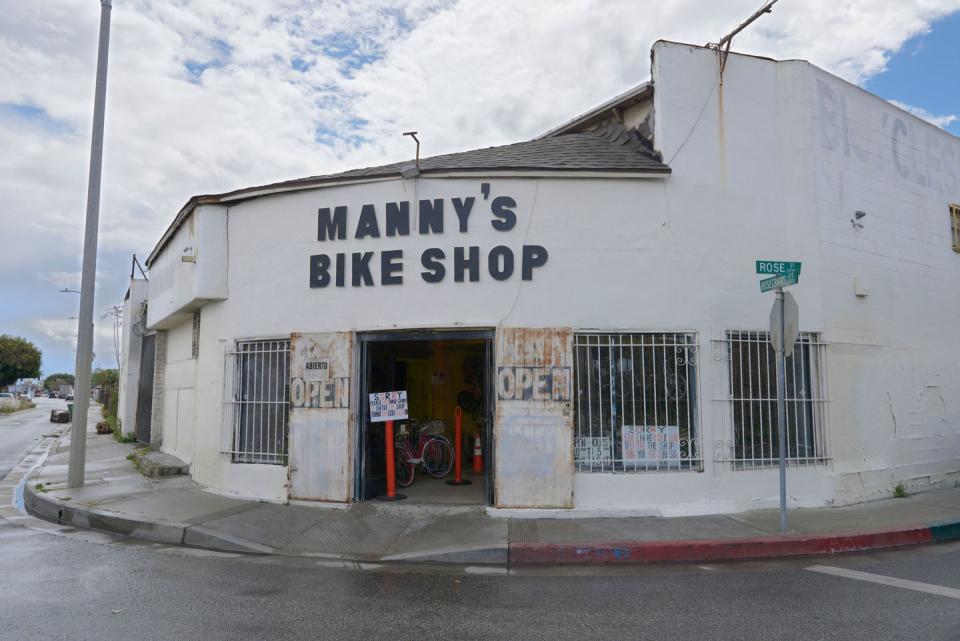
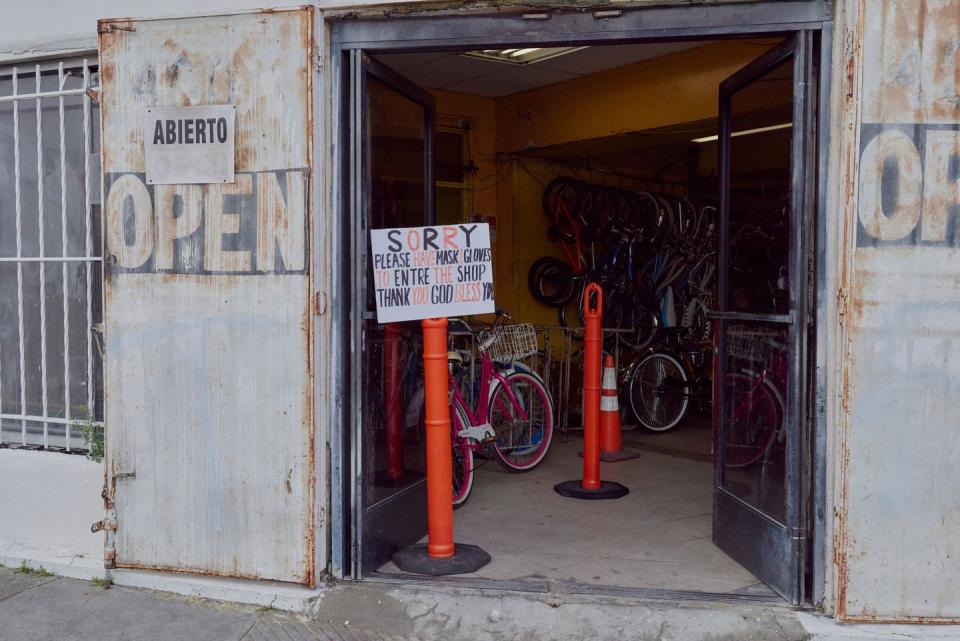
At Manny’s Bike Shop in Compton, the façade is plain and worn. Inside, tires are piled on the floor in five-foot-tall stacks. Near the entrance to the maintenance area, where three men wrench on bikes with masks on, hangs a sign that declares “Please: $1 por air, no exceptions.”
Elaborate lowriders hang from the walls and ceilings. These intricately fabricated bikes—with a long wheelbase, tall ape-hanger handlebars, and whitewall tires—are adorned in gold and chrome. A glass case displays an extensive selection of chromed mirrors and old-school airhorns with big rubber bulbs. Manny Silva, who opened this shop in the 1970s after he emigrated from the Mexican state of Chihuahua to Compton, says he makes those bikes himself and also builds custom bikes for locals with adaptive challenges. In some circles, people call Silva the Godfather of Lowriders.
The shop may be full of gleaming, hand-built machines, but Silva says his best sellers are cruisers and mountain bikes from the brand Micargi (also available on Amazon and at Walmart) that sell for less than $200. “Most everyone who comes in are local people who ride for transportation,” he says, noting that sales have dipped in the past week as maintenance requests have remained level. “They’re here to buy tubes or tires or maybe to get flat tires fixed or their gears and brakes adjusted.”
Silva says that many of his customers ride for fitness or self-expression, but even more ride as a means to get around. “A lot of people here ride bikes because they’re less expensive than cars,” he says. “If you ride a bike, you don’t need to pay for gas or insurance.”
A mechanic is installing fenders on a stripped-down beach cruiser that sits on a repair stand. Silva says that this customer has given him a $10 deposit to kick start an overhaul of the bike that will include new brakes, wheels, chain, and fenders. He expects it will take weeks to collect the full price of the repairs. “We’re not getting a lot of people coming in right now,” he says. “I think it has less to do with being worried about getting sick, because right now a lot of people around here just don’t have jobs and money.”
When asked why he’s staying open amid all this uncertainty, Silva is matter-of-fact: “We’re here for the community,” he says. “We’re not looking to get rich.”
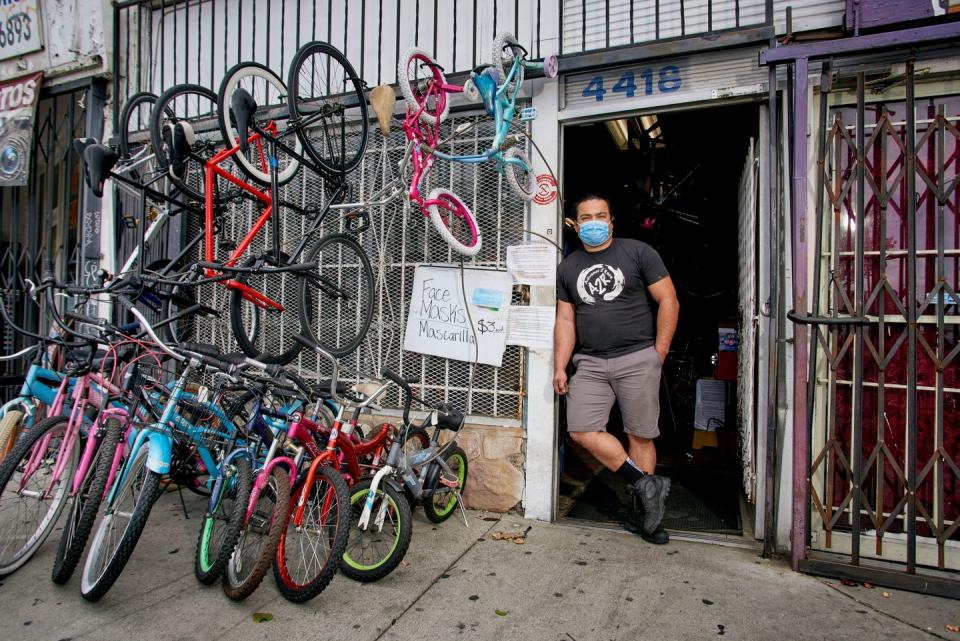
Census data indicates that one in eight households in the city of Los Angeles don’t have a car. That figure is considerably higher in a low-income community like South LA.
Consider the neighborhood known as South Park—where Paisano’s is located, as well as another popular shop called Linares. Here the community is 79 percent Latino, 19 percent black, and zero percent white. According to data compiled by the real estate brand Trulia, households in this zip code have only 0.37 vehicles per capita, roughly half the median in LA. And according to an analysis published by the Los Angeles Times, the median household income in South Park is $29,518.
Many customers rely on their neighborhood shops because they don’t have the luxury of doing repair work themselves. “If you have a bad cut, you go to a doctor,” says Tejeda, who notes that most of his customers lack even the most basic tools like pumps and levers. “People bring their bikes here. It’s a trade for a reason.”
There is new signage posted at Paisano’s to make sure customers don’t go near the mechanics. “Yeah we are nervous,” says Tejeda, noting that many customers are now dropping off and picking up bikes on the curb, so they don’t even enter the shop. “We are using a lot of alcohol and hand sanitizer.”
Tejeda says he has two big categories of customers: kids and young people who ride for fun, and then everyone else. “The older folks don’t use their bikes for fun,” he says. “It’s their transportation. And right now, more people are riding their bikes to work. They don’t feel safe on the bus and there are less cars in the road now.”
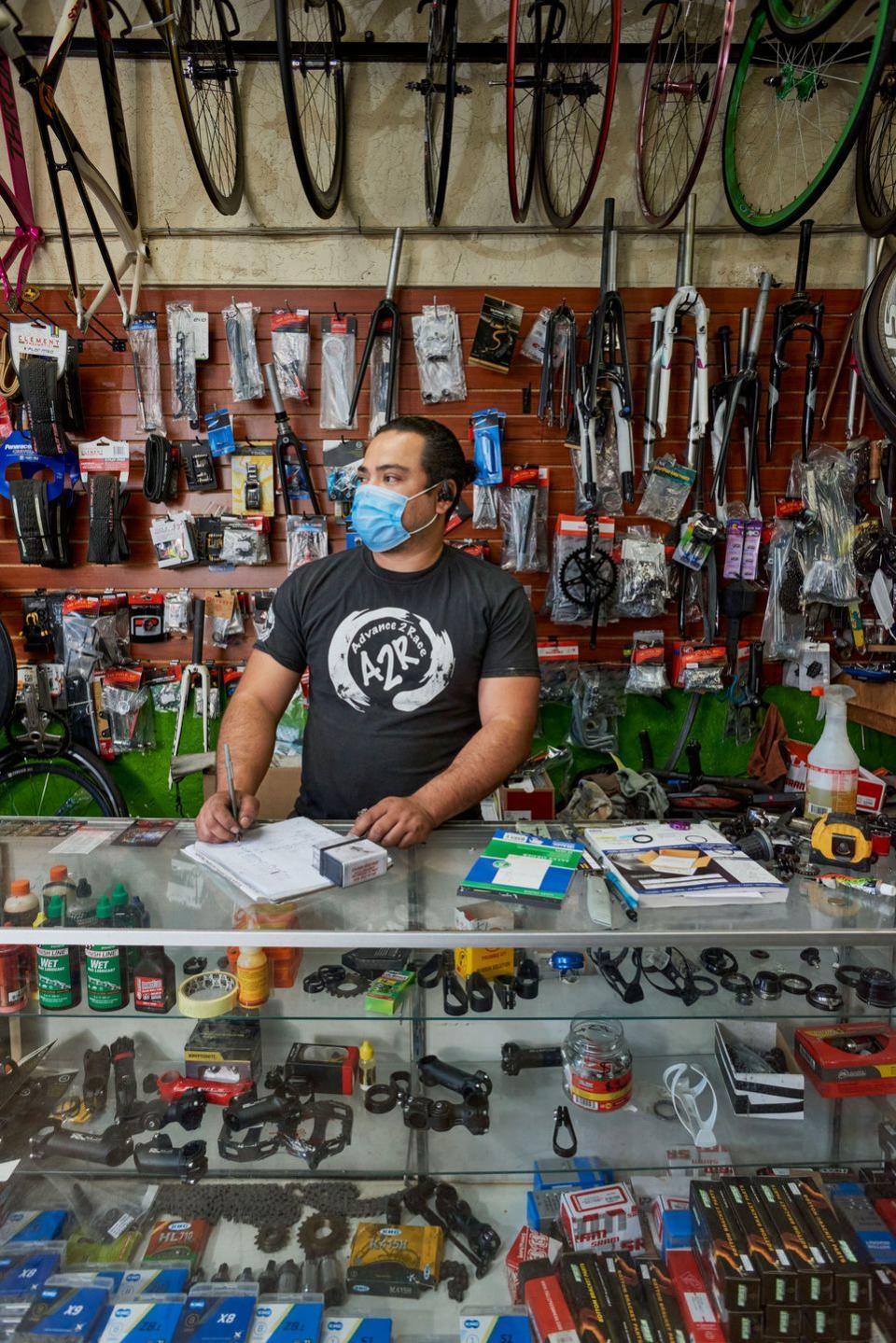
The story is similar at Linares. A mechanic there says that foot traffic in the store has gone up in the past few weeks. “More people are coming in because they don’t want to take the bus,” he says. “People who used to take the bus, now they tell me that they feel more safe on a bike. In LA, it usually was the other way around.” As he talks, a couple strolls in and asks about child seats and helmets.
The shop has helmets that cost less than $20. Owner George Linares, who opened the shop six years ago, says sales of lights have been strong, too. “People are riding more for transport than before,” he says. One of the most popular models he sells is a flat-bar single speed with coaster brakes from Retrospec for about $200. For those on a tighter budget, he sells mountain bikes and cruisers for about $150. “A lot of my customers are Hispanic people who work downtown and use bikes for transportation,” he says. “Over here people need bikes to be moving around.”
When asked how things are really going, Linares looks at his feet for a minute and bites his lower lip. “I’ve started closing the shop earlier now. I’m worried a lot about the business,” he says, pointing to the register. “What we make today is what me and the employees have for the day.”
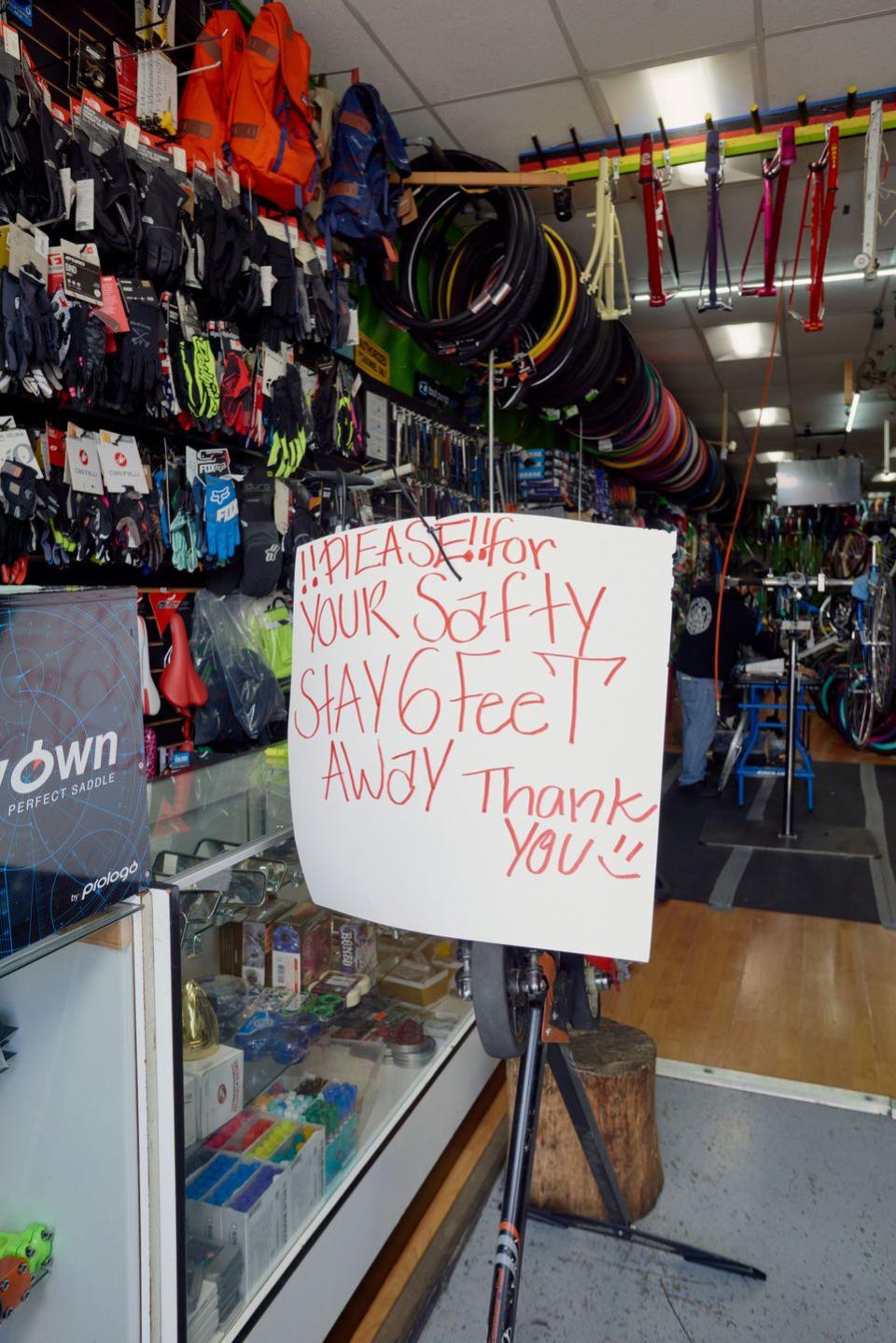
Felipe Ambrosio owns two shops in LA. Because of the COVID crisis, he has closed his original location on Wilshire Boulevard. But his second store (Felipe’s #2 on 7th Street in Pico Union) has stayed open. Directly adjacent to downtown LA, the neighborhood is 85 percent Hispanic, with one of the largest Salvadoran communities in the city.
Unlike the other shops, Felipe’s focuses on riders who want to go fast. The narrow shop is a sort of fixie paradise. Cinelli frames hang from the ceiling, as do an assortment of road tires in every imaginable color. Things like Fi’zi:k bar tape, Look cleats, Specialized saddles, and Continental tires are on display.
Ambrosio speaks very little English, so his assistant Jerry Mendoza, who’s worked at the shop for five years, translates and adds color. Mendoza points to his Steppenwolf mountain bike and says that the ride to work is way more peaceful than usual. “It’s more fun to ride around the city right now,” he says. “The roads are safer.” When asked about the inventory on the floor, he says that their most popular bikes are fixed-gear models from Golden Cycles and Throne—bikes that typically cost $250 to $600—but they haven’t been selling many bikes lately.
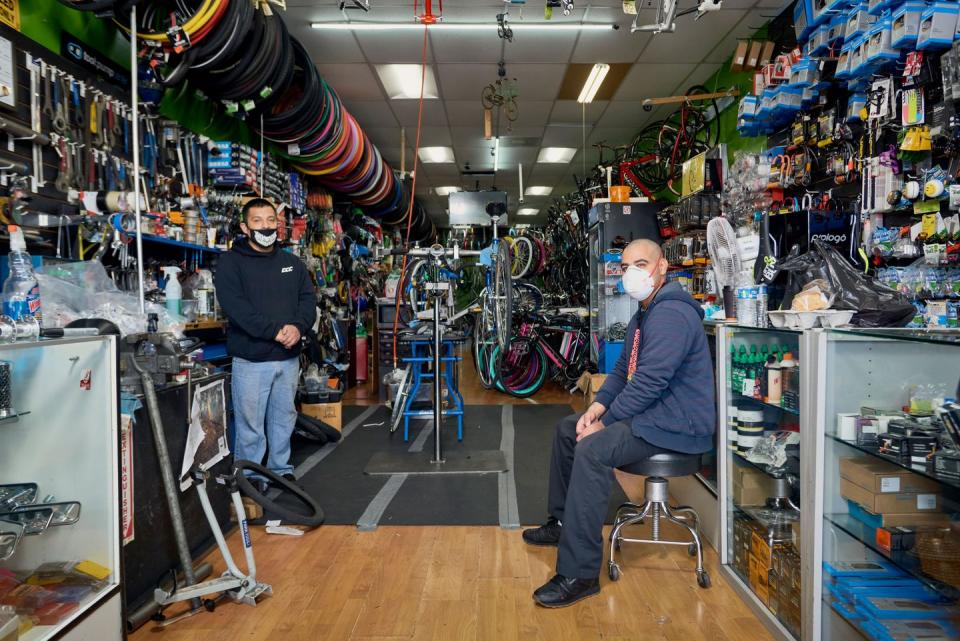
Right now, they’re taking whatever business walks through the front door. And that’s maintenance work. Ambrosio is tinkering with the gears on a mountain bike that hangs on his stand. Customer Gil Carde, who’s bantering with Ambrosio and Mendoza in Spanish, says he bought the bike on Craigslist a few days ago for $200. “It’s better to take around town than my regular bike,” says Carde, who winds up buying a set of $20 grips for the bike as we chat. “And I’ve started riding it up in the hills—no one’s up there right now.”
When asked how business is going, Ambrosia gets animated as he responds in Spanish. “He says business has gone down a lot because people have no money, no jobs,” Mendoza says, translating before he adds his own commentary. “He is scared to work in the shop now, but he has no choice. He needs money for his house.”
You Might Also Like

